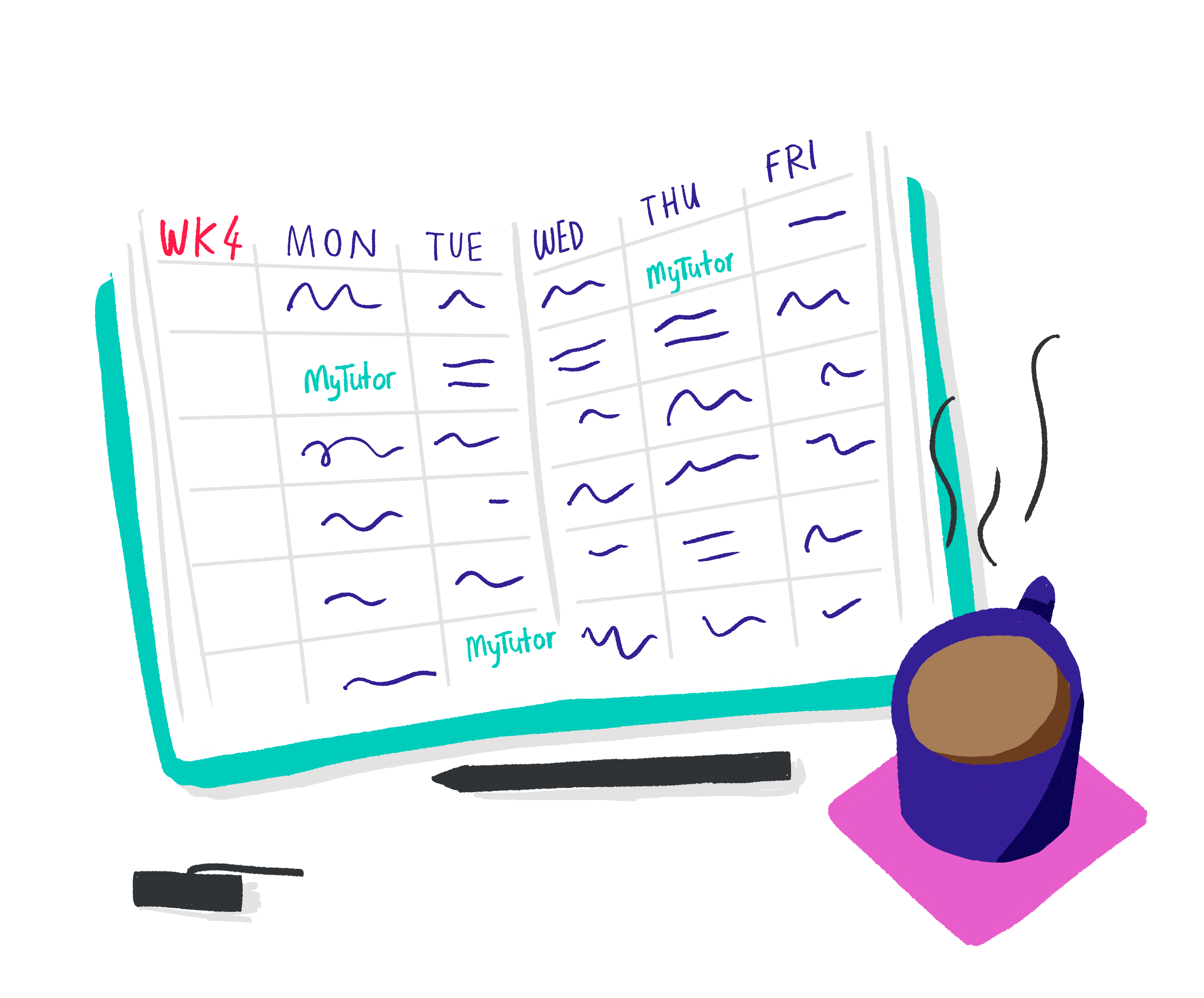A solid revision timetable is the key to exam success. It also has the added benefit of breaking everything down into more manageable chunks – and helping revision to feel much less overwhelming!
The ideal revision timetable will also factor in a good study/life balance to help you stay on track, without burning yourself out. Keep reading and discover our 10 tips for creating the ultimate GCSE or A-Level revision timetable – including top tips from our MyTutor tutors on TikTok.
1. Choose analogue or digital
A written, analogue timetable can be more visible and easier to use, especially if you prefer to write things down and manually tick things off. However, a digital timetable on an app like Google Calendar can be more flexible, and you can easily make changes to it.
2. Break subjects into topic chunks
Make your revision seem less overwhelming by breaking big subjects into key topic areas. It can also be helpful to measure your progress based on which topics you’ve understood and memorised, rather than how long you’ve studied for – as that’s what really matters.
3. Strategise your revision approach
Prioritise topics according to your strengths, but also your exam timetable. Focus the majority of your effort on topics most likely to come up in the exam and carry the most marks.
“Know the specification for each exam inside out. They’re available online. This way you know what to focus on by quickly identifying the areas you know well and the areas you don’t know as well.” – Nketia, MyTutor tutor on TikTok
4. Go for 25-minute revision slots
According to the Pomodoro technique, 25 minutes is the optimum time to be studying without losing concentration. You might prefer to study for longer, but try not to go over 60 minutes, otherwise your brain switches off.
“I don’t know where I’d be without the app, Forest. It helps minimise distractions on your phone and it’s super motivating to see how many trees you’ve grown at the end of revision time slots.” – Otylia, MyTutor tutor on TikTok
5. Mix up high, medium and low energy revision activities
“Studying the same way every day can feel boring and it’s actually not the best use of your time. We all learn in different ways. If you’re tired after a long day at school, choose a low-energy activity from the low-energy list, like watching a revision video or playing online flashcard games.
“Medium-energy activities include making flashcards, drawing mind maps, creating topic posters and highlighting key words in your notes. While high-energy activities might be timed exam questions, past papers, practicing writing an essay.” – Matt, expert exam MyTutor tutor.
6. Schedule in proper breaks and days off
Your breaks are just as important as your revision sessions. They allow your brain to recharge and digest all the information you’re taking in. Plus, proper days off help to prevent burnout. “Take at least 10-20 breaks in between revision sessions, and try to go for walks.” – Janice, MyTutor tutor on TikTok
7. Make time to do past practice papers
Try to do practice papers around a month, a week and a few days before each exam. It will help you familiarise yourself with the format of the exam and quickly highlight areas you need to refocus on.
8. Make it flexible
Don’t be afraid of tweaking and updating your revision timetable as you go. This is why a digital timetable can be handy. “Plans change and it may well be that a task you thought would take an hour, ends up taking a whole evening. Or you might zip through it! It’s good to be flexible with your plans and to remember to keep asking yourself, ‘in this moment, what’s the best use of my time?’” – Rose, MyTutor tutor.
9. Make it achievable
Try not to cram too much into each day, and make sure to schedule in enough time to rest and recharge. Focus on quality over quantity, and remember that you can only do your best each day. It’s better to revise effectively for a shorter period of time, than to try and revise for hours and hours.
10. Connect with a tutor to help you stay on track
A tutor can help in lots of different ways with revision. “We can focus on whatever you think is the best use of your time. Would doing some practice papers and going through them in a tutoring session help? Is there a certain concept you’re really stuck on and is it most productive to spend a whole session getting to grips with that particular concept?
“If it’s helpful for you we can make a plan of action for the weeks leading up to your exam and you can keep checking in with me so that you feel on top of your progress. We can also schedule in extra sessions if you feel like you might need them.” – Rose, MyTutor tutor.
Want to find a tutor who can help to complement your revision plan? Find a MyTutor tutor here. And if you want to get organised with the latest exam timetables, here’s our guide to all the A-Level and GCSE exam timetables 2023.
Looking for more?
Head back to our GCSE Maths revision hub for revision guides, videos and more!




